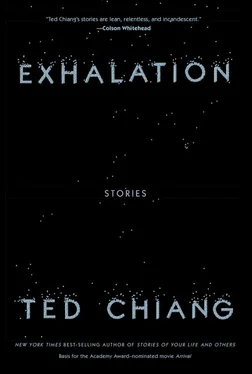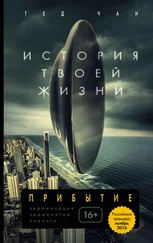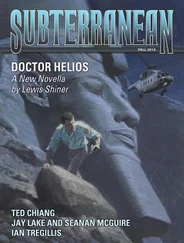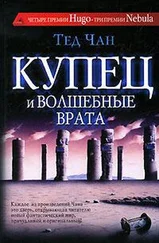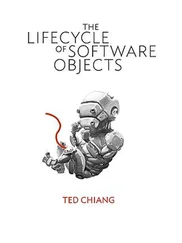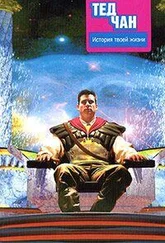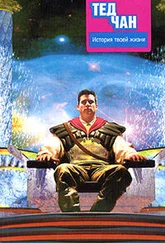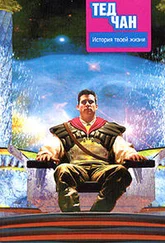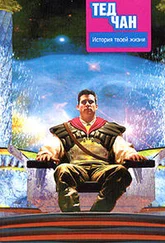I was speechless for a moment. Then I asked how Lawson explained the existence of humanity and life on Earth. Dr. McCullough took the manuscript from my hands, flipped through the pages until he found the section he was looking for, and then handed it back to me.
Reading, I saw that Lawson offered three hypotheses for the presence of humanity. The first was that humanity was the result of a separate act of creation, an experiment or test performed as rehearsal for the main undertaking. The second was that the creation of humanity was an unintended side effect, a kind of “sympathetic vibration” induced because of our solar system’s similarity to 58 Eridani. The third was that humanity on Earth was in fact the main undertaking, and life on 58 Eridani was the rehearsal or side effect. He rejected this last one as unlikely, because if we assume that miracles are signs of your attention, Lord, then a continuous miracle like a star orbiting a planet must be a clear indicator of what you consider most important.
Lawson concluded his paper by acknowledging that many of his conclusions were necessarily speculative, and he invited other hypotheses that fit the observations just as well or better. As I stared at the page, I tried to come up with an alternate explanation, but couldn’t think of any. Then I looked up at McCullough, who nodded as if I were a student arriving at the correct answer.
“It’s a compelling theory,” he said sourly. “And it becomes more so when you consider that it solves many unanswered questions. The multiplicity of languages, for example.”
I realized he was correct. Why are the languages of the world so different? Philologists have struggled to reconcile their variety with the age of the Earth and the rate at which languages diverge. If you had imbued all the primordial humans with knowledge of a common tongue, Lord, we’d expect the world’s languages to all bear a family resemblance, like the Indo-European ones. But the vastly greater differences between languages of the world means there must have been more than a dozen completely unrelated languages spoken immediately after creation. We have long wondered why you would have done that, Lord. But if the disparate populations of primordial humans had each invented language independently, then there was no puzzle to be solved; the multiplicity of languages was accidental rather than by design.
“So now you know,” said Dr. McCullough. “The paper will be published soon, and everyone will read it. I wanted to recommend that it be rejected, but I couldn’t find any grounds for doing so. My commitment to scientific practice made me approve it.” He scowled. “But what if the entire practice of science is founded on a false premise? When I was a boy I used to wish that God had given primordial men the gift of writing, because they would’ve been able to record the dates on which new stars appeared in the night sky. Then we’d know precisely how far away each star was, because we’d know—to the day—when each one’s light first reached the Earth. But men didn’t invent writing until long after the emergence of the stars, so astronomers are forced to use more indirect means to deduce their distances. My teachers told me that God wanted us to reason things out for ourselves. But what if that’s not true? What if”—his voice cracked—“what if God had no intentions about us at all?”
This was the crisis of faith that Wilhelmina had referred to. I clumsily tried to offer some reassurance, saying that this was an enormously confounding discovery, but we could still retain our faith in God. Dr. McCullough shouted, “Then you understand nothing!”
His wife touched his hand, and he grasped hers, struggling to contain his feelings. The two of them were silent for a while. Then Mrs. McCullough turned to me and said, “We had a son, older than Mina by ten years. His name was Martin. He died of influenza.”
I told them how sorry I was. I recalled that “Martin” was the name Wilhelmina had used when donating the relics.
Dr. McCullough said, “You are childless, so you can’t comprehend the pain caused by losing a son.”
I told him he was correct and said that now I realized why this discovery must be especially difficult for the two of them.
“Do you really?” he asked.
I told him what I surmised: that the only thing that had made his son’s death bearable was the knowledge that it was part of a greater plan. But if humanity is not in fact the focus of your attention, Lord, then there is no such plan, and his son’s death was meaningless.
Dr. McCullough remained stone-faced, but his wife nodded. “I’ve enjoyed your books, Dr. Morrell,” she said. “They remind me of the things Nathan said when I was a student of his, before we married. In his lectures he talked about how scientific inquiry provided the strongest foundation for faith. He said, ‘Personal convictions may waver, but the physical world cannot be denied,’ and I believed him. So when Nathan threw himself into his research after Martin’s death, it wasn’t just for his solace, but for mine, too.”
“And I was successful,” said Dr. McCullough quietly. “I found wave oscillations within the Sun, the echoes of the initial compression God used to initiate the gravitational collapse responsible for its heat and light.”
“It was like finding God’s fingerprints on our world,” said Mrs. McCullough. “At the time, it provided all the reassurance we could have asked for.”
“But now I wonder if it proves anything,” he said. “All stars must have wave oscillations within them; there’s nothing that sets us apart. Nothing science has discovered carries any meaning.”
I told him that science can be a salve to our wounds, but that shouldn’t be the only reason we pursue it. I said we have a duty to search for the truth.
“Science is not just the search for the truth,” he said. “It’s the search for purpose.”
And I had no response. I had always assumed those were one and the same, but what if they aren’t?
I don’t know what to think now. It frightens me to imagine that you have never been listening at all.
· · ·
Dear Rosemary,
The last few weeks have been very difficult for me, more so than I expected. I am writing to let you know that I have temporarily left the Arisona dig.
As I told you in my last letter, I thought I would be able to participate in the dig because, even with all that had happened, I believed my affinity for the physical work of archaeology would carry me through. As it turned out, it wasn’t as easy to carry on as I expected. The doubts sown by Lawson’s discovery have been gnawing at my mind like rodents. A few days ago it reached the point that, as I was removing a spearpoint from the soil matrix, I thought, What does this matter? Everything we’re doing here is irrelevant. I had to stop working for fear that I might smash an ancient artifact with a hammer out of frustration. That was when I knew I had to leave the dig. I don’t know if there was a real risk of me doing that, but the mere fact of it crossing my mind told me I was not in a fit state of mind to work there.
I have taken residence in a rental cabin about an hour away from the dig. I couldn’t explain to anyone why I was leaving, since I feel it would be inappropriate for me to talk publicly about Lawson’s paper before it’s published. Perhaps that contributed to my feeling of isolation while I was there, but I think the greater cause was that I feel estranged from God. I need time to decide what I should do next.
You asked whether the Church oughtn’t be disturbed by the discovery just as much as the secular scientific community, and to that I would say yes, they ought to be. But the Church as an institution has always been able to derive strength from the evidence when it’s useful and ignore it when it’s not. Take the story of Adam and Eve. The Church was willing to admit it could not be literally true after skeletons of primordial humans were found around the world, but they insisted the story retained foundational importance as an allegory. And you and I and every other woman continue to live in Eve’s shadow, for no reason except custom. So I expect that they will be able to explain away this discovery in a similar fashion and use it to advocate for the same values they always have.
Читать дальше
